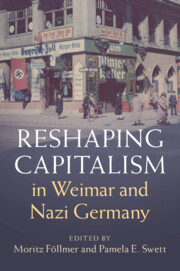
- Cited by 1
-
Cited byCrossref Citations
This Book has been cited by the following publications. This list is generated based on data provided by Crossref.
2022. BIBLIOGRAPHY. International Review of Social History, Vol. 67, Issue. 2, p. 379.
- Publisher:
- Cambridge University Press
- Online publication date:
- January 2022
- Print publication year:
- 2022
- Online ISBN:
- 9781108985192




